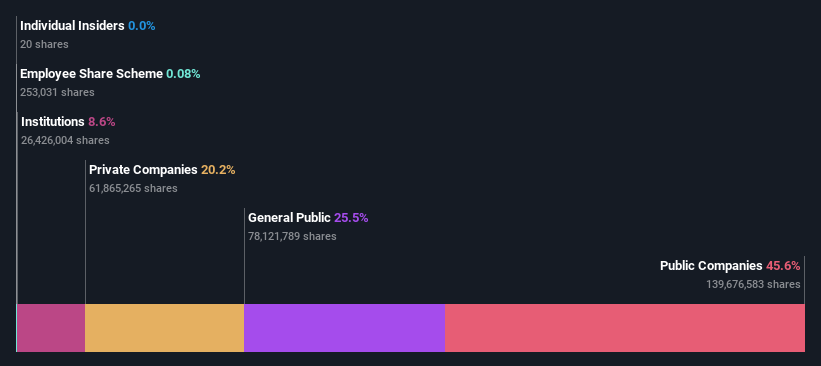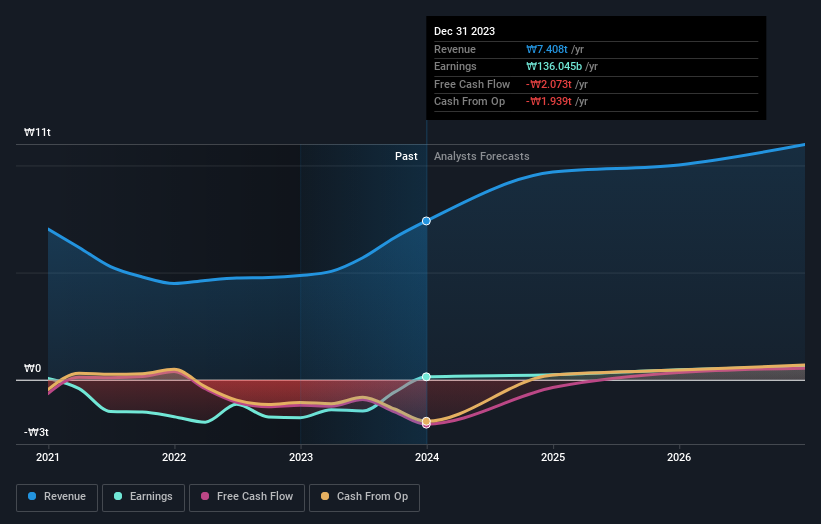Stock Analysis
- South Korea
- /
- Machinery
- /
- KOSE:A042660
Hanwha Ocean Co., Ltd.'s (KRX:042660) market cap surged ₩306b last week, public companies who have a lot riding on the company were rewarded

Key Insights
- The considerable ownership by public companies in Hanwha Ocean indicates that they collectively have a greater say in management and business strategy
- A total of 3 investors have a majority stake in the company with 54% ownership
- Analyst forecasts along with ownership data serve to give a strong idea about prospects for a business
Every investor in Hanwha Ocean Co., Ltd. (KRX:042660) should be aware of the most powerful shareholder groups. With 46% stake, public companies possess the maximum shares in the company. Put another way, the group faces the maximum upside potential (or downside risk).
As a result, public companies collectively scored the highest last week as the company hit ₩10t market cap following a 3.1% gain in the stock.
Let's take a closer look to see what the different types of shareholders can tell us about Hanwha Ocean.
Check out our latest analysis for Hanwha Ocean

What Does The Institutional Ownership Tell Us About Hanwha Ocean?
Institutional investors commonly compare their own returns to the returns of a commonly followed index. So they generally do consider buying larger companies that are included in the relevant benchmark index.
Hanwha Ocean already has institutions on the share registry. Indeed, they own a respectable stake in the company. This suggests some credibility amongst professional investors. But we can't rely on that fact alone since institutions make bad investments sometimes, just like everyone does. When multiple institutions own a stock, there's always a risk that they are in a 'crowded trade'. When such a trade goes wrong, multiple parties may compete to sell stock fast. This risk is higher in a company without a history of growth. You can see Hanwha Ocean's historic earnings and revenue below, but keep in mind there's always more to the story.

Hanwha Ocean is not owned by hedge funds. The company's largest shareholder is Hanwha Aerospace Co., Ltd., with ownership of 23%. For context, the second largest shareholder holds about 20% of the shares outstanding, followed by an ownership of 12% by the third-largest shareholder.
After doing some more digging, we found that the top 3 shareholders collectively control more than half of the company's shares, implying that they have considerable power to influence the company's decisions.
Researching institutional ownership is a good way to gauge and filter a stock's expected performance. The same can be achieved by studying analyst sentiments. There are plenty of analysts covering the stock, so it might be worth seeing what they are forecasting, too.
Insider Ownership Of Hanwha Ocean
While the precise definition of an insider can be subjective, almost everyone considers board members to be insiders. Management ultimately answers to the board. However, it is not uncommon for managers to be executive board members, especially if they are a founder or the CEO.
Insider ownership is positive when it signals leadership are thinking like the true owners of the company. However, high insider ownership can also give immense power to a small group within the company. This can be negative in some circumstances.
Our information suggests that Hanwha Ocean Co., Ltd. insiders own under 1% of the company. However, it's possible that insiders might have an indirect interest through a more complex structure. It is a pretty big company, so it would be possible for board members to own a meaningful interest in the company, without owning much of a proportional interest. In this case, they own around ₩664k worth of shares (at current prices). Arguably, recent buying and selling is just as important to consider. You can click here to see if insiders have been buying or selling.
General Public Ownership
The general public, who are usually individual investors, hold a 26% stake in Hanwha Ocean. This size of ownership, while considerable, may not be enough to change company policy if the decision is not in sync with other large shareholders.
Private Company Ownership
We can see that Private Companies own 20%, of the shares on issue. It might be worth looking deeper into this. If related parties, such as insiders, have an interest in one of these private companies, that should be disclosed in the annual report. Private companies may also have a strategic interest in the company.
Public Company Ownership
It appears to us that public companies own 46% of Hanwha Ocean. It's hard to say for sure but this suggests they have entwined business interests. This might be a strategic stake, so it's worth watching this space for changes in ownership.
Next Steps:
I find it very interesting to look at who exactly owns a company. But to truly gain insight, we need to consider other information, too. For instance, we've identified 3 warning signs for Hanwha Ocean (2 can't be ignored) that you should be aware of.
If you would prefer discover what analysts are predicting in terms of future growth, do not miss this free report on analyst forecasts.
NB: Figures in this article are calculated using data from the last twelve months, which refer to the 12-month period ending on the last date of the month the financial statement is dated. This may not be consistent with full year annual report figures.
Valuation is complex, but we're helping make it simple.
Find out whether Hanwha Ocean is potentially over or undervalued by checking out our comprehensive analysis, which includes fair value estimates, risks and warnings, dividends, insider transactions and financial health.
View the Free AnalysisHave feedback on this article? Concerned about the content? Get in touch with us directly. Alternatively, email editorial-team (at) simplywallst.com.
This article by Simply Wall St is general in nature. We provide commentary based on historical data and analyst forecasts only using an unbiased methodology and our articles are not intended to be financial advice. It does not constitute a recommendation to buy or sell any stock, and does not take account of your objectives, or your financial situation. We aim to bring you long-term focused analysis driven by fundamental data. Note that our analysis may not factor in the latest price-sensitive company announcements or qualitative material. Simply Wall St has no position in any stocks mentioned.
About KOSE:A042660
Hanwha Ocean
Operates as a shipbuilding and offshore contractor in South Korea and internationally.
Moderate growth potential with mediocre balance sheet.


